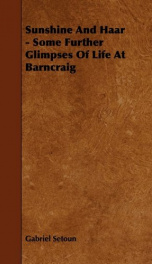robert burns

Purchase of this book includes free trial access to www.million-books.com where you can read more than a million books for free. This is an OCR edition with typos. Excerpt from book: CHAPTER V THE EDINBURGH EDITION Edinburgh towards the close of last century was a very different place from Edinburgh of the present day. It was then to a certain extent the hub of Scottish society; the centre of learning and literature; the winter rendezvous of not a few of the nobility and gentry of Scotland. For in those days it had its society and its season; county families had not altogether abandoned the custom of keeping their houses in town. All roads did not then lead to London as they do now, when Edinburgh is a capital in little more than name, and its prestige has become a tradition. A century ago Edinburgh had all the glamour and fascination of the capital of a no mean country; to-day it is but the historical capital invested with the glamour and fascination of a departed glory. The very names of those whom Burns met on his first visit to Edinburgh are part of the history of the nation. In the University there were at that time, representative of the learning of the age, Dugald Stewart, Dr. Blair, and Dr. Robertson. David Hume was but recently dead, and the lustre of his name remained. His great friend, Adam Smith, author of The Wealth of Nations, was still living; while Henry Mackenzie, The Man of Feeling, the most popular writer of his day, was editing The Lounger; and Dr. Blacklock, the blind poet, was also a name of authority in the world of letters. Nor was the Bar, whose magnates have ever figured in the front rank of Edinburgh society, eclipsed by the literary luminaries of the University. Lord Monboddo has left a name, which his countrymen are not likely to forget He was an accomplished, though eccentric character, whose classical bent was in the direction of Epicurean parties. His great desire was to revive the traditions of the elegant suppers of c...
Info about the book
Author:
Series:
Unknown
ASIN:
B003YOS01K
Rating:
3/5 (4)Your rating:
0/5
Languge:
English
Users who have this book
Users who want this book
What readers are saying
What do you think? Write your own comment on this book!
write a commentif you like robert burns try:
Other books by this author
Do you want to read a book that interests you? It’s EASY!
Create an account and send a request for reading to other users on the Webpage of the book!




